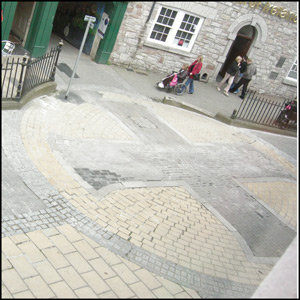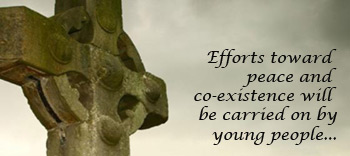By Janine Quarles
Peace. For the present, it requires a necessary effort. In Armagh the work of political and social forces has been clear: to turn the need for peace into a reality. Not many young people would be able to remember an attack on American soil before September 11, 2001, nor would they characterize their "troubles" as involving paramilitary factions battling the government in the name of civil rights.
 But in Northern Ireland, people both young and old are aware of the potential threat of conflict . This region was in turmoil for 30 years. According to CNN, 3,693 people were killed between 1966 and 1999 with over 36,000 people being injured. Most people killed were civilians. And now miraculously Protestants and Catholics in Northern Ireland have established a peace - and with this, the country is struggling with an "integration challenge" all its own. Armagh, a tiny city in Northern Ireland, is no exception.
At one time, the Reverend Ian Paisley, leader of the Democratic Unionist Party, and Martin McGuinness, Deputy Leader of Sinn Fein, as representatives of the two extremes in the political spectrum, would not have entered into dialog. But now, the two share power as First Minister and Deputy First Minister [on an equal par] of a unified government. Both McGuinness and Paisley took an oath that included the promise of ministers to "prevent discrimination and support non-violence and exclusively peaceful means." Both Nationalists and Unionists have come together in government as part of a 108-member Assembly and 14-member executive body.
But while the days of the "popery code" (a series of 16 th century laws prohibiting Catholics from owning land and holding a profession) and Protestant professions of "No Surrender!" are long over, the aftermath of the more recent "troubles" in Northern Ireland is still very new. With the highly favored Good Friday Agreement of 1998, which hands the political power of Northern Ireland over to the voting majority making it a democracy, it's easy to wonder about the future of community relations in Northern Ireland. But according to some locals in Armagh, "people will never go back to violence any more."
First Steps toward Integration
The city today is quiet and peaceful. It's difficult to imagine a sectarian atrocity as recent as 1998 in the nearby town of Omagh, but the citizens of Armagh are still wary. The people here come from a variety of backgrounds, faiths, and opinions; the census estimates that the town is roughly 45 percent Catholic and 55 percent Protestant. While most here are optimistic about the peace process, many believe the first step is tolerance; integration seems to be more of an ideal. However, local professionals and politicians seem to be optimistic about progress overall.
 For example, at a forum of the John Hewitt International Summer School held in Armagh's Market Place Theatre and Arts Centre July 26, representatives from the four major parties - Democratic Unionist Party, Ulster Unionist Party, Sinn Fein, and the Social Democratic Labour Party - appeared together to discuss peace efforts and the newfound working relationship with one another.
"Ten years ago, you would never have seen those four politicians together," said Gregory Knipe, a professor at the University of Limerick and a native of Armagh.
"That goes to show you that people will never go back to violence...they've gotten used to living a normal life."
Knipe also said that a united Ireland is inevitable and will be beneficial, especially in the area of economics and business. But first the loyalist community must be convinced that there is nothing to fear or lose. "I don't believe people think in terms of integration," he said. "Governments do, but people don't. If Northern Ireland is to come together and build community, they have to get rid of that divide." And some people are jump-starting that process.
Father Kevin Donaghy, principal of St. Patrick's Grammar School, has partnered with the Protestant Royal School in an effort to "put the children from the two different groups in the same classroom with one another." He said that students at both schools seem to have an interest in technology and media.
"Ultimately the effort will come to foster bonds of friendship and co-operation between the two groups," Donaghy said.
When asked about the integrated school system, Donaghy, like Knipe, also said that most people don't think in terms of integration per se, but more along the lines of tolerance, diversity, and coexistence. Parents are deeply focused on a school's reputation, academic track record, or overall meaning to the family; these issues are more important than whether the school brings together Catholics and protestant students.
"A child is more likely to want to attend a school because their favorite football player went there, not necessarily because of their [religious background]," Donaghy remarked. "The children know that sectarianism isn't allowed...there's zero tolerance for it."
Challenges for the 'Integrated' School in Northern Ireland
Donaghy also said he believed that the option of integrated schools should be available." Most likely 50-60 percent of local residents would agree." Today, approximately 60 integrated schools now operate in Northern Ireland, two of which are in Armagh. The schools include Armagh Integrated College, a primary school of 153 students that opened in September 2004. However, the college is having difficulty meeting educational standards, and there has been talk of closing the school. When asked if the challenges at the college are due to a lack of consensus or support for integrated education, Donaghy said no. "It's mostly the difficulty in delivering the range of [subjects]." But the fact remains that only about 5-6 percent of local Armagh citizens actually send their children to integrated schools; the concept is new and not readily accepted.
Politicians Struggle Toward Healing Mostly, the burden of integration and fostering peace falls on the politicians. Kenneth Donaldson, youth development officer for the Ulster Unionist Party, says he would love to see integration in housing and schools, but Northern Ireland has to first get to the point of tolerance.
"We're at a very early stage," said Donaldson. "I don't think that full blown integration will happen overnight. But for now collaboration is really important."
Donaldson, 26, reflects on his own life in Armagh. He already sees differences in interaction among residents in Armagh, particularly the young people. "Ten years ago it was extremely rare for Catholics to be on the Mall in the evening. Protestants congregated there. Now you can see both sets of uniforms walking together," he said.
"Because we're the new generation, we're not so embroiled about the past...because we all grew up in the same system, I'll always have more in common with a Nationalist than a British man."
Donaldson seems to have the same idea as his counterpart in the Republican Sinn Fein political party, Damian White. Both Donaldson and White work with young people within the two parties.
"We're pro-peace," said White, "but still working toward our primary objectives."
Those primary objectives include working toward a united Ireland, and a 32-county Democratic Socialist Republic. White also acknowledged the increase in Catholics joining the police force, adding that representatives from the Ulster Unionist Party were opposed to their doing so.
"There's still no trust or confidence [in the police], but now there's hope for change," White said.
That hope for change could be coming from the recent victory of Sinn Fein and other Republicans desiring to have police leadership moved from Britain to Stormont [home of the Irish parliament] in Belfast, where the Northern Ireland Assembly meets.
White remains unsure about the peace process. "I can't see there being peace forever," White said. "We'll never give up our fight for Irish freedom," he said. "Îf we do get what we want, there's still a minority group of people that may be willing to fight to get what they want. Loyalists still have arms and full backing of the state."
 How realistic is the promise of the peace? Citizens are uncertain. Many Republicans believe that a united Ireland is inevitable, but the fact is that Britain still has its hand in governing the North.
As in the American civil rights movement of the late 1960s, the efforts toward peace and co-existence will be carried on by young people, who at last have the power and opportunity to examine the events of the past and adopt a new future. Ultimately, people in Northern Ireland won't listen for a special "Protestant" or "Catholic" bias or ask the leading question, "What's your name?" to determine what someone's religion is. It's fair to say that one day everyone will see that there isn't much difference; and that the common bonds of blood and history Irish share will make this nation peaceful at last.
Story by Janine Quarles
Photos by Felicia Chapman
Video by Kyle Saadeh
Web Design by Lauren Hicks
|

